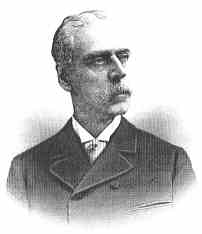Charles C. Goodwin
What was it like to be a hobo in the 1930s? How about a hippie in the 1960s? Unless you were there, you probably will never know. And if you were there, the world has changed so much--and pulled you along with it--that the feelings and emotions you once felt have become but dim memories.
It is even more difficult to get inside the minds of the California '49ers who traveled many thousands of miles and endured countless hardships for gold that for most of them, was nearly gone when they arrived.
For us today it is hard to understand the mind-set of the early prospectors, whose ranks include many members of the Hickman family, and most especially Martin D., Warren D., Thomas J., James B., and William A., as well as Samuel M. Butcher and several others. Perhaps a poem will help, written by someone who lived through it from the beginning.
Between 1880 and 1901 Charles Carroll Goodwin (1832-1917) was editor of the Salt Lake Tribune. This poem was first published at Virginia City, Nevada in
The Inland Empire in 1869 or 1870, and because it is an extraordinary piece of literature, it was reprinted in Edward Tullidge's History of Salt Lake City.
THE PROSPECTOR.
by C.C. Goodwin
How strangely tonight my memory flings
From the face of the past its shadowy wings,
And I see far back through the mist and tears
Which make the record of twenty years;
From the beautiful days in the Golden State,
When Life seemed taking a lease of Fate;
From the wond'rous visions of "long ago"
To the naked shade that we call "now."
Those halcyon days; there were four with me then---
Ernest and Ned; wild Tom and Ben.
Now all are gone; Tom was first to die;
I held his hands, closed his glazed eye;
And many a tear o'er his grave we shed,
As we tenderly pillowed his curly head
In the shadows deep of the pines that stand
Forever solemn, forever fanned
By the winds that steal through the Golden Gate,
And spread their balm o'er the Golden State.
And the others, too, they all are dead;
By the turbid Gila perished Ned;
Brave, noble Ernest, he was lost
Amid Montana's ice and frost;
And Bennie's life went out in gloom
Deep in the Comstock's vaults of doom.
And I am left, the last of all.
And as tonight the cold snows fall,
And barbarous winds around me roar,
I think the long past o'er and o'er---
What I have hoped and suffered, all,
From the twenty years roll back the pall
From the dusty, thorny, weary track,
As the tortuous path I follow back.
In my childhood's home they think me, there
A failure, or lost, till my name in the prayer
At eve is forgot. Well, they cannot know
That my toil through heat, through tempest and snow,
While it seemed for naught but a portion of pelf,
Was more for them, far more than myself.
Ah well, as my hair turns slowly to snow,
The places of childhood more far-away grow;
And my dreams are changing; 'tis home no more
But shadowy hands from the other shore
Stretch nightly down, and it seems as when
I lived with Tom, Ned, Ernest and Ben.
And the mountains of earth seem dwindling down;
And the Hills of Eden, of golden crown
Rise up, and I think in the last great day,
Will my claims above bear a fire assay?
From the slag of earth and the baser stains
Will the cupel of Death show of precious grains
Enough to ensure me a welcome above,
In the temples of Peace, in the mansions of Love?
--Edward Tullidge, History of Salt Lake
City, 1886, Appendix, page 35.
To learn more about C.C. Goodwin, click here.
To read another poem set in Galena Gulch, click here.
To learn about our Hickman prospectors, choose below:
To return to the Hickman Family index page, click here.

 | ||||||